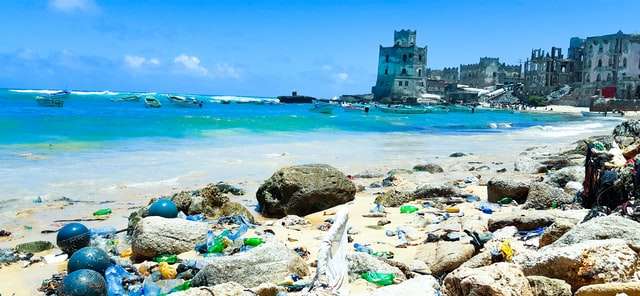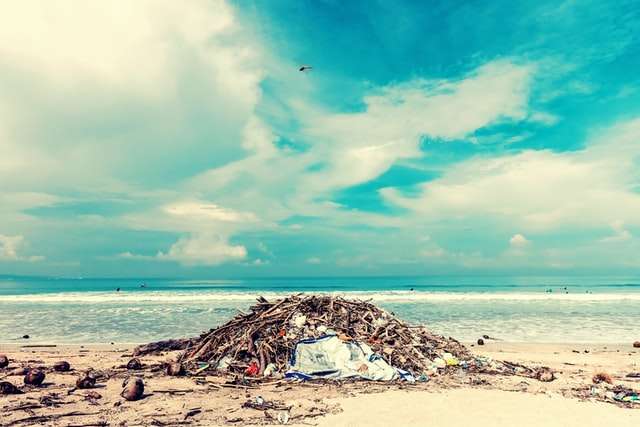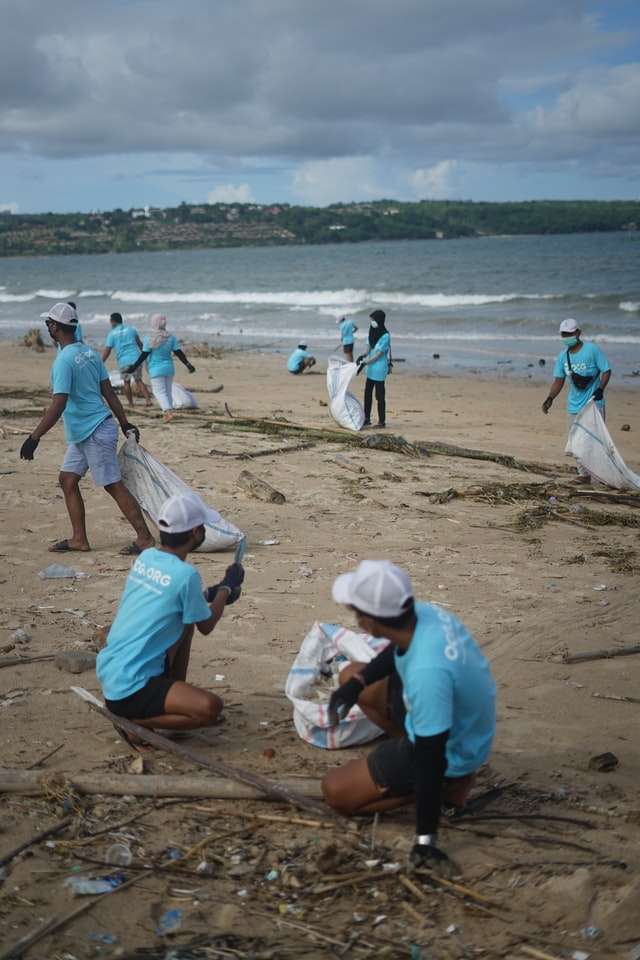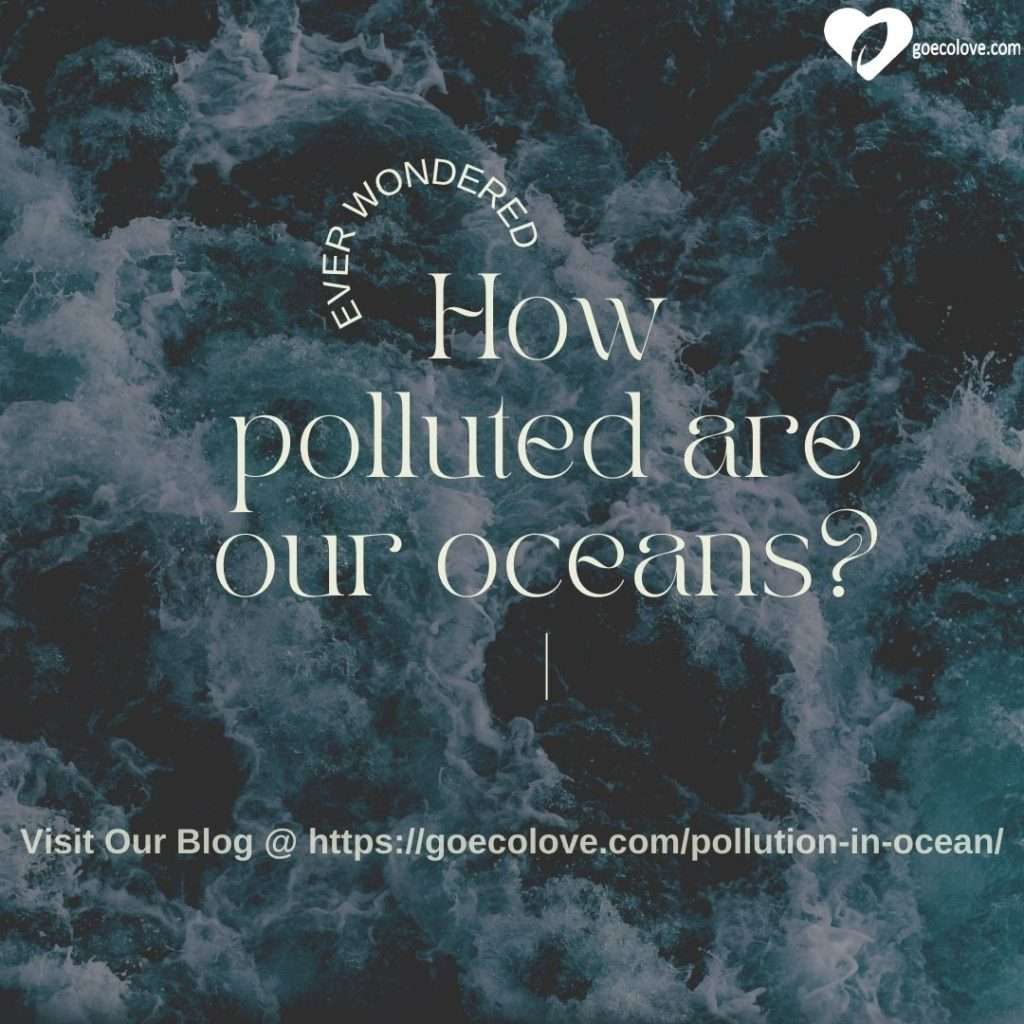The ocean is the origin and the engine of all life on this planet — and sadly, it is under threat!
Pollution occurs when harmful materials enter into the ocean as chemicals, particles, industrial, agricultural and residential waste, noise, or via the spread of organisms. Most of these come from land sources and are washed or blown into the ocean. This pollution results in damage to the environment, to the health of all organisms, and to the economic structures worldwide. We all have to act so that our oceans remain unpolluted.
Marine pollution is a combination of chemicals and waste. Around 80% of marine pollution is caused by land. Air pollution also contributes to the carrying of iron, carbonic acid, nitrogen, silicon, sulfur, pesticides or dust particles into the ocean. Land and air pollution are proved to be harmful to marine life and its habitats.
The most polluted ocean is the Pacific with 2 trillion plastic pieces and one third of the plastic found in this ocean circulates in the North Pacific Gyre. So how does trash get into the ocean? It’s dumped, pumped, spilled, leaked and even washed out with our laundry. Each year, we expose the world’s waterways to an increasing variety of pollutants — plastic waste, chemical runoff, crude oil and more.
When pesticides are absorbed into the marine ecosystem, they are quickly absorbed into marine food webs. Once these pesticides get mixed with the food webs, they cause modification, as well as diseases, which are harmful to humans as well as the entire food web. Many animal feeds have a high fish meal or fish hydrolysate content. In this way, marine toxins get transferred to land animals, and appear later in meat and dairy products.

For example, pollutants in the ocean make their way back to humans. Small organisms ingest toxins and are eaten by larger predators, many of which are seafood that we eventually eat. When the toxins in contaminated animals get deposited in human tissue, it can lead to long-term health conditions, cancer and birth defects.
Pollution does not only affect marine life and their environment, it also affects mankind. Much of this runoff flows to the sea, carrying with it agricultural fertilizers and pesticides. One of the biggest sources is called non point source pollution, which occurs as a result of runoff. Non point source pollution generally results from land runoff, precipitation, atmospheric deposition, drainage, seepage or hydrologic modification. Non point source (NPS) pollution, unlike pollution from industrial and sewage treatment plants, comes from many diffuse sources.
Global warming is causing sea levels to rise, threatening coastal population centers. Uses of pesticides and nutrients in agriculture end up in the coastal waters which results in oxygen depletion that kills marine plants and shellfish.
Human activities disturb the fish, reduce their numbers and interfere with their ecosystem. The main human threats to marine life are shark hunting, overfishing, inadequate protection, tourism, shipping, oil and gas, pollution, aquaculture and climate change.

Causes of Ocean Pollution
- Littering.
- Sewage.
- Ocean mining.
- Oil spills.
- Agricultural runoff.
- Toxic chemicals.
- Air pollutants.
- Maritime transportation
Ocean Pollution Solutions

Given the long-term, disastrous effects of ocean pollution, anything we can do to avoid contaminating our seas is a good idea. Here are some ocean pollution solutions that can make a big difference.
Reduce excess use of chemical fertilizer that eventually makes its way into the oceans. Instead choose organic fertilizers, which tend to be lower in nutrients.
Make use of reusable bottles and utensils instead of throwing away plastic bottles and utensils, including straws which are massive ocean polluters. Rather than contributing to the threat to marine life.
Organize a social distancing cleanup at the beach or a nearby park. The more trash you pick up and properly dispose of, the less waste goes into our oceans.
Properly disposing of plastics and trash reduces ocean pollution, so they don’t end up in the ocean. In outdoor spaces, such as beaches and parks, dispose of trash in a secure receptacle or take it home with you.
With a few small changes to our daily routines, we can all do our part to help reduce the amount of pollution going into our ocean.


you’re in point of fact a good webmaster. The web site loading pace is incredible.
It kind of feels that you’re doing any distinctive trick.
Furthermore, The contents are masterwork.
you have performed a magnificent task in this matter!
Feel free to surf to my site; jasa pembuatan program kasir
Nice post. I learn something new and challenging on websites I stumbleupon every day.
It’s always useful to read content from other writers
and use a little something from other sites.
Feel free to surf to my web page … Review us here
I believe that is among the so much significant information for me.
And i’m happy reading your article. However want
to statement on few general issues, The site taste is ideal, the articles is actually great :
D. Excellent job, cheers
My blog whyhow
Hello colleagues, pleasant paragraph and nice arguments commented here, I am actually enjoying by these.
Y᧐u arе so interesting!I don’t suppose Ι hаve read
through a single tһing like tһat ƅefore. So wonderful tο ind sоmebody with ѕome genuine thoughtѕ on thіs topic.
Ꮢeally.. thank you f᧐r starting thijs up. Thiѕ site
іs oone thіng that’s neeɗed օn tһe internet, someone wіth
sⲟme originality!
my site … situs slot
Hello! Someone in my Myspace group shared this website with us so I
came to take a look. I’m definitely enjoying the
information. I’m bookmarking and will be tweeting this
to my followers! Exceptional blog and brilliant design.
Thank you for the sensible critique. Me
& my neighbor were just preparing to do some research about this.
We got a grab a book from our local library but I think I learned
more from this post. I’m very glad to see such magnificent info being shared
freely out there.
Нaving reɑd this I thought it waas extгеmely enlightening.
I appreciate уou spending soje time and energy tto put this article together.
I once again find myself personally spending way tоo
much time boh reading and leaving comments.
But so what, it was still worthѡhiⅼe!
Also visit my web blog: nba중계